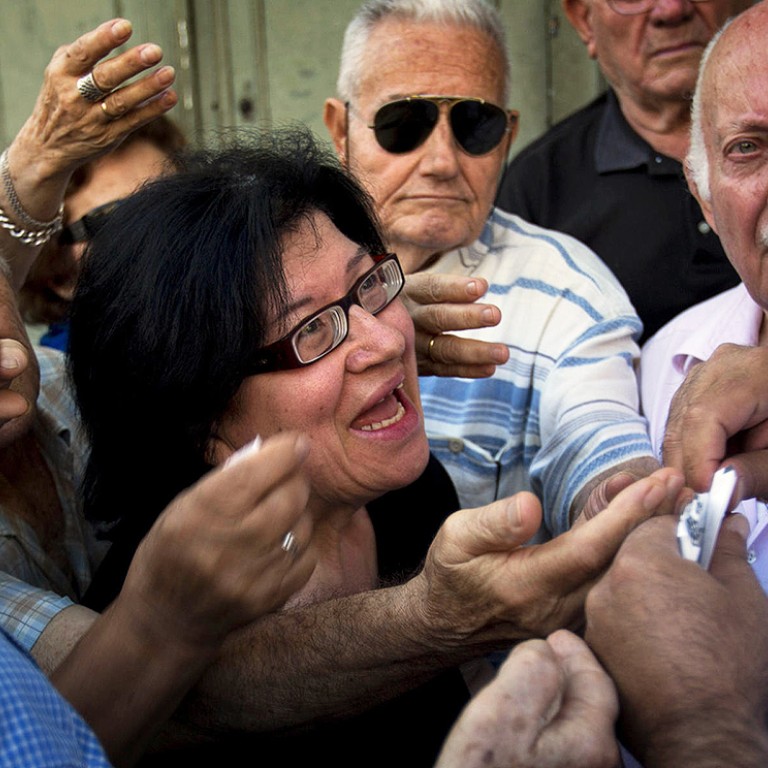
Grexit fears felt all over Asia as Hang Seng sees sharpest fall in more than three years
Investors look to safe havens after 'No' vote in Greek referendum, while HK index dives 3pc, its sharpest one-day fall in over three years
Hong Kong's benchmark Hang Seng Index had its sharpest one-day decline in three-and-a-half years yesterday, leading a wider slump in Asian markets as investors fretted over a Greek vote to reject an aid-for-reform package from its creditors that raised the risk of a euro currency break-up.
The "No" vote in the Greek referendum saw investors flock to safe-haven trades, lifting US Treasuries and the US dollar, hurting the euro and commodities, and whipsawing Hong Kong equity investors whose nerves were already frayed by a weekend of emergency measures from Beijing to end a brutal mainland market rout.
We see some … opportunities as the Hong Kong market is slightly over-reacting
Adding to the uncertainties, following the referendum, Yanis Varoufakis quit as Greek finance minister, while Germany insisted that the ball was in Athens' court if it wanted to stay in the euro zone.
European stocks fell after the vote but there was no rout. The European FTSEurofirst 300 index edged down 0.6 per cent, while Germany's DAX was down 0.8 per cent and Italy's FTSE MIB index fell 2.3 per cent. Italy, Spain and Portugal are seen as the economies most vulnerable to contagion from Greece.
The Hang Seng Index lost more than 1,000 points at one stage yesterday before closing the day down 3.2 per cent, or 827.83points, at 25,236.28. That was the sharpest single-day decline since November 10, 2011, when the index fell 1,050.54 points.

Investors are closely watching whether Greece will be able to repay its debt on July 20 when the €3.5 billion (HK$30 billion) owed to the European Central Bank comes due. If Greece is unable to pay, the ECB could stop its funding, triggering a chain reaction with negative implications for the markets.
The Hong Kong Monetary Authority, the city's de facto central bank, said it was ready to supply liquidity to the banking sector in the wake of the "No" vote.
Shanghai stocks managed to end higher as Beijing's market rescue efforts boosted blue chips. But shares listed in Shenzhen continued to slump as investors rushed to cash out of smaller firms and more leveraged bets were forced to close.

Only 26 per cent of margin trading has been settled in the mainland market while another 30 per cent of such leveraged bets will come up for settlement soon, potentially weighing down the market, said a Citibank report.
Leveraged bets accounted for 12 per cent of the value of the mainland's floating shares as of the end of June, from around 4 per cent a year earlier, according to JP Morgan Asset Management.
The sell-off in Hong Kong tracked other Asian markets yesterday, with Japan's Nikkei dropping 2.08 per cent and Sydney down 1.14 per cent. In Singapore, Canada's Manulife Financial Corp shelved its S$569 million (HK$3.27 billion) initial public offering of a real estate investment trust, the first major Asian offering outside China to be pulled due to volatile global markets.

Some market players said they saw buying opportunities in Hong Kong shares. "We see some buy-on-dip opportunities as the Hong Kong market is slightly over-reacting to Greek worries," said Catherine Cheung, head of investment strategy and research at Citibank.
"Technically, the 200-day average of 24,800 of the Hang Seng Index is a good support level and the price-to-forward-earnings is standing at just 11.4 times, suggesting a relatively limited downside for Hong Kong stocks," said Cheung.
Yesterday's parade of losers were led by market operator Hong Kong Exchanges and Clearing, which plunged 9.55 per cent to HK$235 after Goldman Sachs downgraded it to a "sell", with a target price of HK$220.

